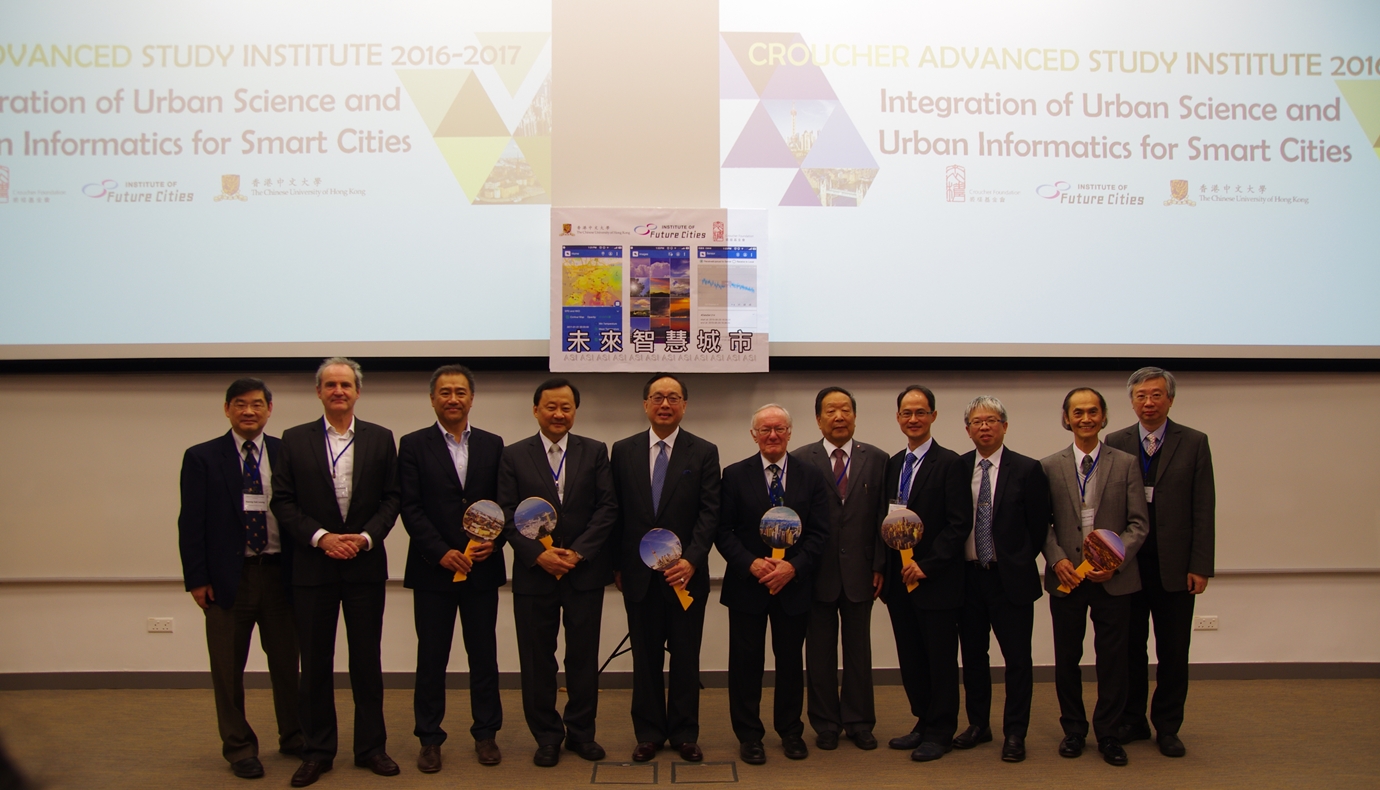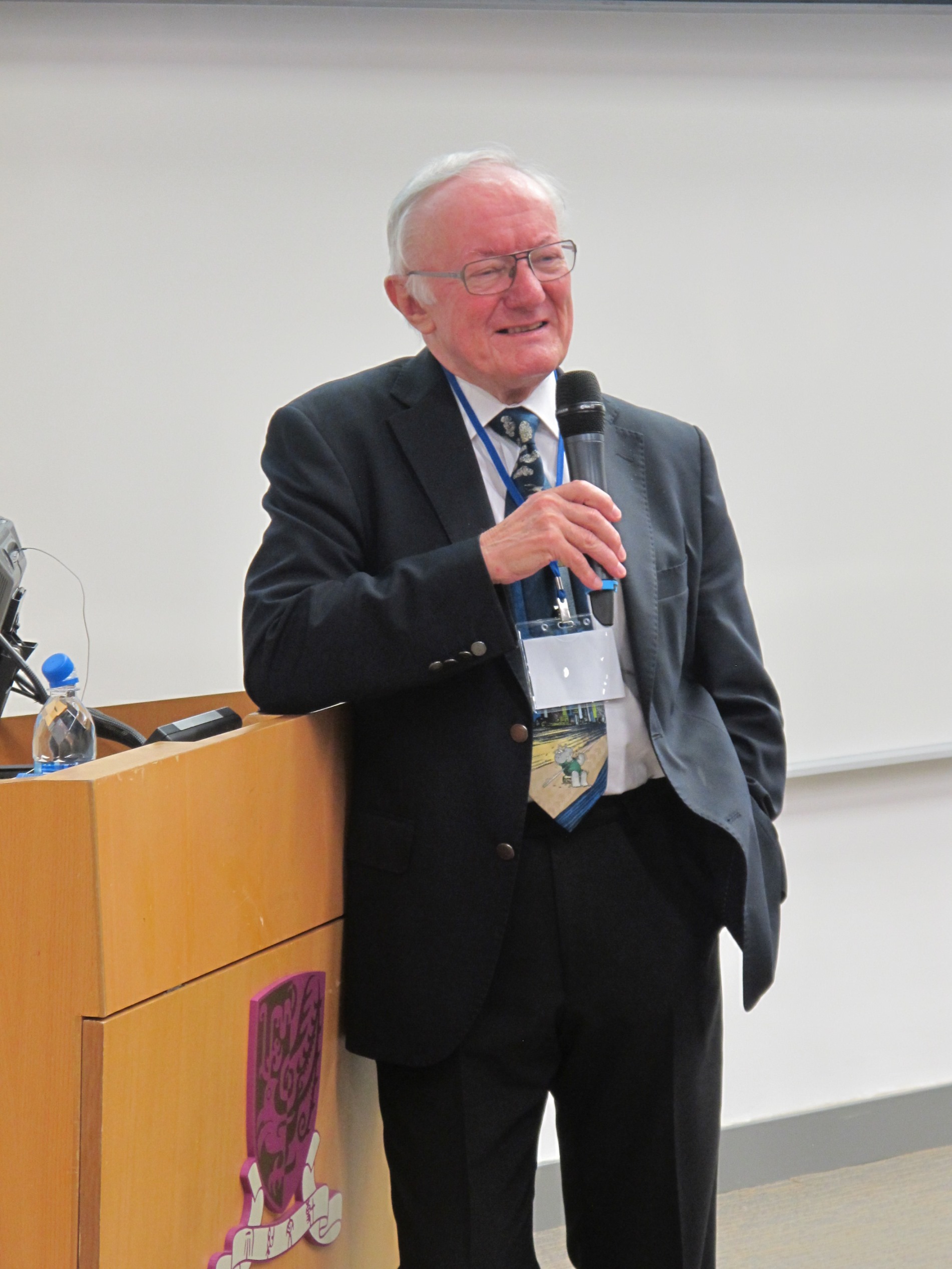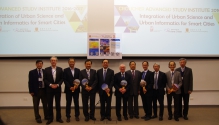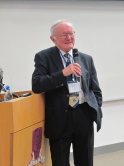CUHK
News Centre
CUHK presents Croucher Advanced Study Institute 2016-2017Integration of Urban Science and Urban Informatics for Smart Cities
With the support of the Croucher Foundation, The Institute of Future Cities (IOFC) of The Chinese University of Hong Kong (CUHK), presents the Croucher Advanced Study Institute 2016-2017 on ‘Integration of Urban Science and Urban Informatics for Smart Cities’on 10-12 January 2017 on CUHK campus. The conference has invited 6 global top-ranked researchers on urban science and urban informatics to give keynote speeches, including Prof. Michael Batty, Bartlett Professor of Planning at University College London, Prof. Luís Bettencourt, Professor of Complex Systems at the Santa Fe Institute, Mr. Charlie Catlett, Senior Computer Scientist at Argonne National Laboratory, Prof. Deren Li, Director of the National Laboratory for Information Engineering in Surveying, Mapping and Remote Sensing of Wuhan University, Prof. Gerhard Schmitt, Professor of Information Architecture at the Swiss Federal Institute of Technology in Zürich (ETH Zürich), and Prof. Yee Leung, Director of the Institute of Future Cities at The Chinese University of Hong Kong (CUHK).
The opening ceremony of the Croucher Advanced Study Institute was held this morning, with around 150 guests attended. Officiated at the ceremony were Mr. Nicholas W. Yang, Secretary for Innovation and Technology, Innovation and Technology Bureau, HKSAR Government, Dr. C. M. Cheng, Assistant Director (Forecasting and Warning Services), Hong Kong Observatory, Mr. Raymond K. W. Lee, Director of Planning, Planning Department, Prof. Benjamin Wah, Pro-Vice-Chancellor, CUHK, Prof. Chi Yue Chiu, Dean of Faculty of Social Science and Prof. Yee Leung, Director of the Institute of Future Cities.
The three-day conference aims to give inspiring lectures to researchers, practicing professionals and advanced students on the research frontiers of urban theory and urban science for smart cities, and state-of-art ICT technology on urban informatics in the big-data era, with the view to drawing out a plan for future smart-city research and practice.
Prof. Michael Batty teaches at University College London. He has worked on computer models of cities and their visualisation since the 1970s and has published several books, such as ‘Cities and Complexity’ which won the Alonso Prize of the Regional Science Association in 2011, and most recently ‘The New Science of Cities’. His research group is working on simulating long term structural change and dynamics in cities as well as their visualisation. He is a Fellow of the British Academy (FBA) and the Royal Society (FRS) and was awarded the CBE in the Queen’s Birthday Honours in 2004. In the conference, he will describe the effects the redistribution of resources and migration in different nations or regions have had on long term urban change.
Prof. Luís Bettencourt teaches at the Santa Fe Institute. He has conducted research work at the University of Heidelberg in Germany, Los Alamos National Laboratory and at the MIT Center for Theoretical Physics. He has worked extensively on cities and urbanization. His research emphasises the creation of new interdisciplinary synthesis to describe cities in quantitative and predictive ways, informed by the growing availability of empirical data worldwide. Prof. Bettencourt has published several edited books and over 100 peer reviewed publications on theoretical and statistical physics, computational neuroscience, information theory, and urban studies. His work has been extensively covered in the media, including pieces in The New York Times, Scientific American, Nature, The Economist, Harvard Business Review, and other leading international publications. In the conference, he will speak about how the exchange of information between people promotes development in human societies that is positive and that ultimately can be sustainable. He thinks that, apart from sustaining balanced economic growth, it is also important to sustain a more positive relationship between human societies and the Earth’s natural environments.
Mr. Charlie Catlett is the founding director of the Urban Center for Computation and Data (UrbanCCD) of the Argonne National Laboratory, which brings scientists, artists, architects, technologists, and policy makers together to use computation, data analytics, and embedded systems to analyse the dynamics, design, and resilient operation of cities. He leads the NSF-funded Array of Things project, establishing a network of 500 Argonne-developed intelligent sensor units in Chicago. In the conference, he will explain how to manipulate the new data sources to solve urban questions.
Prof. Deren Li from the National Laboratory for Information Engineering in Surveying, Mapping and Remote Sensing of Wuhan University, is an expert in photogrammetry and remote sensing. He was selected as a member of the Chinese Academy of Sciences in 1991 and a member of the Chinese Academy of Engineering in 1994. Prof. Li has concentrated on research and education in spatial information science and technology represented by remote sensing (RS), global positioning systems (GPS) and geographic information systems (GIS). Prof. Li has published over 760 papers and 11 books. In the conference, he will share the problems and challenges caused by big geospatial data of the smart city and the integration of reality and virtual space.
The research of Prof. Gerhard Schmitt from the Swiss Federal Institute of Technology in Zürich focuses on urban metabolism with the associated emissions, smart cities and linking big data with urban design, urban models, simulation and visualization. He initiated and conceptualized the sustainable ETH Science City Campus in Zürich and received for this work the 2010 European Culture of Science award. In the conference, he will explain the next phase after building up a smart city. Prof. Schmitt thinks that citizens are mostly observed subjects rather than actors in the current smart city but he believes that, with planning led by its citizens, responsive cities will begin to emerge 10 years on.
Prof. Yee Leung is the Director of the Institute of Future Cities of CUHK and the Croucher Advanced Study Institute. He has published 180 academic articles in international journals on his research in urban studies, intelligent algorithms, data mining, and spatial-temporal information systems. The Institute led by him is a multidisciplinary hub for researchers in diverse fields to collaborate on the examination of a wide range of past and present urban issues and to collectively envision, research and advocate innovative approaches to shape future cities to be environmentally friendly, economically prosperous, socially just and sustainable.
About the Croucher Foundation and the Croucher Advanced Study Institute
The Croucher Foundation is an independent private foundation established by the late Noel Croucher in 1979 to promote the standard of the natural sciences, technology and medicine in Hong Kong. To facilitate the exchange of ideas between Hong Kong scientists and their counterparts overseas, the Croucher Foundation sponsors the universities to host the Croucher Advanced Study Institute as a high-level teaching activity to contribute to the dissemination of knowledge and the formation of international scientific contacts.
Institute of Future Cities of CUHK
IOFC consists of four Centres and one programme. They are the Centre of Community and Place Governance, the Centre of Land Resource and Housing Policy, the Centre of Urban Sustainability, the Centre of Urban History, Culture and Media and the Urban Informatics Programme.
The vision of IOFC is to develop into an institute of excellence, a leading multi-disciplinary research institute carrying out impactful research on urban theories and practices covering policy, plans and design especially for Hong Kong, mainland China and Asia. IOFC aims to play a key networking role between the international urban research communities and those in Asia.
From left to right: Prof. Leung Kwong Sak, Associate Directors of IOFC,CUHK, Prof. Gerhard Schmitt, Professor of Information Architecture, Swiss Federal Institute of Technology in Zürich (ETH Zürich), Mr. Raymond K. W. Lee, Director of Planning, Planning Department, Prof. Benjamin Wah, Pro-Vice-Chancellor, CUHK, Mr. Nicholas W. Yang, Secretary for Innovation and Technology, Innovation and Technology Bureau, HKSAR Government, Prof. Michael Batty, Bartlett Professor of Planning, University College London, Prof. Deren Li, Director of the National Laboratory for Information Engineering in Surveying, Mapping and Remote Sensing, Wuhan University, Dr. C. M. Cheng, Assistant Director (Forecasting and Warning Services), Hong Kong Observatory, HKSAR Government, Prof. Chi Yue Chiu, Dean of Faculty of Social Science, CUHK and Prof. Yee Leung, Director of the Institute of Future Cities, CUHK.





